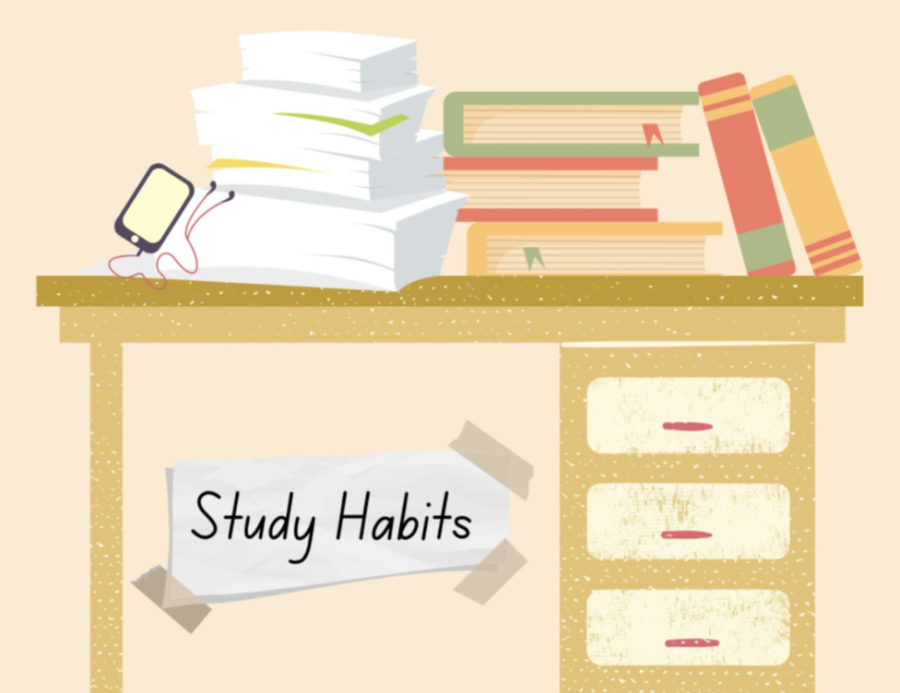Credit: Katya Luzarraga
Students share how last year’s COVID-19 schedule affects their studying habits as life returns to normal. Due to an influx in extracurricular activities and coursework, some students struggle to find time and motivation to study on top of their now busy schedules.
Returning to the old way of studying, in a new perspective
You’re bent over your homework as the blue-white glare of your computer screen stares back at you. Stressed out, overworked and not knowing where to start, students look back at their COVID-19 school year, wishing that the workload now was quite as carefree.
This is what the lives of Wayland High School students look like as they juggle the return back to a normal high school class schedule and the workload that accompanies it, their study habits playing a crucial role in the transition.
“I’m surviving so far, so [my study habits are] kind of working,” junior Jun Waye said. “Maybe not the best grades, so probably not so good on that front. I kind of forgot how to study [with the COVID-19 schedule] and never really got back into it.”
After such an unusual year, students are working hard to readjust to more demanding classes. This means that while students are busy completing the coursework, they are also relearning which study habits work the best for them.
“This year, I have around three tests a day normally and it’s pretty difficult to keep up,” Waye said.
Last year, students were able to use the “Super Wednesdays,” where students only attended advisory, and longer free periods during the rest of the week to complete their homework. However, without the longer free blocks, assignments are eating away at their time for studying.
“Studying times are kind of overcome by homework and other work,” sophomore Abby Wrentmore said.
Returning to a normal class schedule has removed the luxury of studying during the 80 minute class blocks or meeting with teachers for an extended amount of time that aided many students with managing their schoolwork during the pandemic year.
“Having a longer block definitely helped you, and you could talk to your teacher for longer if you had questions or a free,” senior Lauren Medieros said. “Classes weren’t rushed or anything.”
Not everyone at WHS has had such a tough transition back to a normal schedule. Since the upperclassmen, like seniors, experienced a typical freshman year before COVID-19 where they learned how to balance academics and extracurricular activities, they were able to readjust better than many other students.
“I focus better when I do my homework at night, so I kind of like having that break in my day to go out and play sports and do my homework later because it keeps me on track and motivated,” Medieros said. “I have the mindset of ‘I have to get it done.’”
For the underclassmen, they’ve had to rebuild most of their studying habits from scratch. However, returning to normal has also presented many students with new opportunities. Since there has been less social-distancing and restrictions on group gatherings, students have more freedom to plan study groups and one-on-one conferences with teachers.
“I would recommend getting a study group for classes, or just people that you’re close with,” Medieros said. “Being able to bounce ideas off of others and talk to them when you’re confused is very helpful to you and to them. It mutually benefits all of you.”
Although less COVID-19 restrictions present students with new study strategies, it also means that there are more extracurricular activities that take up potential studying time. For many students, it has become necessary to prioritize activities that they are passionate about over certain grades.
“I decided on my own that I’m not going to be spending my freshman and sophomore years completely dedicated to just school,” Wrentmore said. “There are other things that are happening.”
One example of an activity that eats at students studying time is athletics. Last year, students were able to use their “Super Wednesdays” to study and get their homework done before heading to practice. However, now many students go straight from school to sports without any time in between for work.
“In the spring and fall, I don’t get home until around 6:00 p.m. and then after that, I obviously have to eat and shower,” Waye said. “So I normally don’t get started on my work until like 8:00 p.m., and by then I’m already dead tired.”
Since extracurriculars take up so much of students’ time, some have adapted to studying around their busy schedules. For example, by studying or doing homework in the spare minutes between practices or during free blocks the day before the test.
“I think my extracurriculars have affected my time to study, especially when I have soccer, tennis or track,” Medieros said. “We get back super late from games or matches, so I would have to study on the bus or do homework on the bus.”
While this busy schedule might work for some students, it is important to know one’s limits as classes and workloads get more difficult. With the absence of long periods designated for studying in the school schedule, finding out what works best has become essential to students’ success both inside and outside of school.
“Find a balance between prioritizing your mental health over grades and school,” Wrentmore said. “I feel like both are so important, and I don’t think that it’s fair for yourself to risk being sleep deprived for one grade.”
